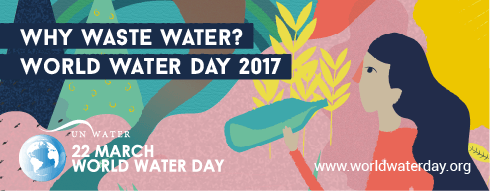Beginning in 1993, the United Nations has designated March 22 every year as World Water Day. The goal of this designation is to bring global awareness and action to the growing water crisis that is plaguing the world. Less than 3% of the water on Earth is potable, and much of that 3% is trapped in Arctic and Antarctic ice. The statistics are staggering: 1 in 10 people do not have access to safe, clean drinking water, and 1 in 3 people do not have access to adequate sanitation. Global warming is exacerbating the water crisis, and populations living in the most arid regions of the world have begun to see water access being used as a tool for violence and oppression. Global water scarcity has economic, environmental, and social ramifications that adversely affect sustainable development efforts. The target goal is for everyone to have access to clean drinking water by 2030 (a part of the 2030 Agenda), and there is a massive amount of work that needs to be done in order to achieve that goal.
World Water Day is primarily sponsored by UN Water, partnering with UN Environment, World Health Organization (WHO), Food and Agriculture Organization of the United Nations (FAO), UNDP, and others. The theme for yesterday’s World Water Day was: wastewater. Conversations about wastewater are equally as important as conversations about clean water. According to the 22 March World Water Day Website:
“Globally, the vast majority of all wastewater from our homes, cities, and agriculture flows back into nature without being treated or reused–polluting the environment, and losing valuable nutrients and over recoverable materials.”
When people think of wastewater, it is easy to assume that the culprit is industry and manufacturing, pumping waste contaminated with toxic chemicals and minerals back into our rivers and oceans. While this is certainly not untrue, some of the biggest sources of wastewater is large-scale agriculture, or agribusiness. The waste that accumulates from factory farms returns to waterways and soil, poisoning both with biological and chemical contaminants as a result of feeding livestock antibiotics. Wastewater can also often be contaminated with human feces as a result of inadequate sanitation and lack of access to toilets. Hydraulic fracking is another source of wastewater, with that water often being deposited back into the ground in wells.
UN Water argues that we can reduce vast quantities of wastewater and reuse what ends up being produced. They outline the various specificities of this solution their Why Waste Water? Factsheet, here. There have been events all over the world surrounding World Water Day, such as celebrations, sensitization and awareness programs, ceremonies, conferences, etc. These events seem to particularly target children and young adults, and are being held in schools and universities. This is logical because water scarcity is the most detrimental to children, and young generations of today and tomorrow are going to be the ones who push the sustainable development agenda to completion.
Sustainable companies are getting in on the awareness action. One Water, a UK brand company whose profits go to fund sustainable water projects in some of the most water-poor regions, used World Water Day as a platform to send an eye-opening message: they created a sleeve for their bottles that make the water inside look filthy and contaminated. One Water’s founder Duncan Goose stated that, “it’s a useful moment of reflection in our busy days and an opportunity to support a business that pours its profits into clean water for everyone”. Not everyone has access to crystal-clear drinking water, and it’s easy to lose sight of that in a developed country where that is rarely an issue (although it can still happen, i.e. the Flint, Michigan water crisis).
The UN is encouraging everyone to get involved by calculating your own water footprint and pledging to reduce overall individual water consumption! For more information on how to do so, you can visit WASHable International’s Facebook event page here.


